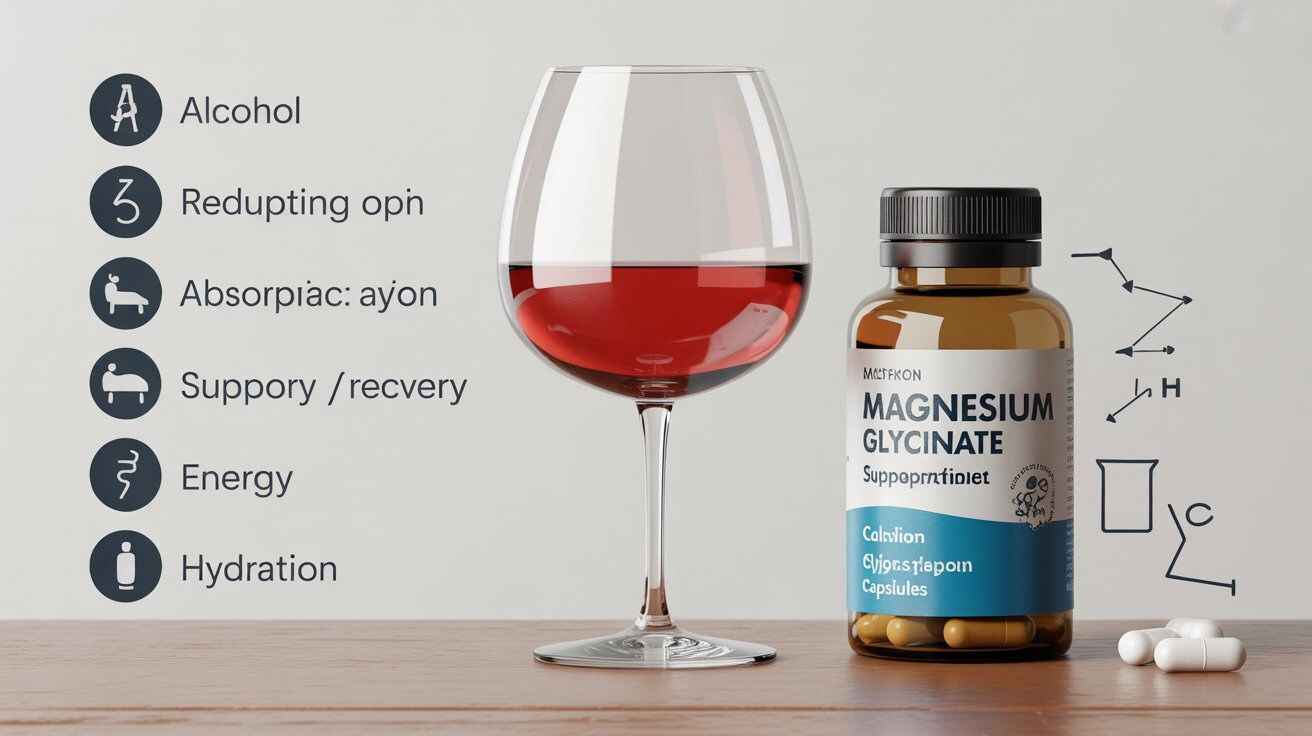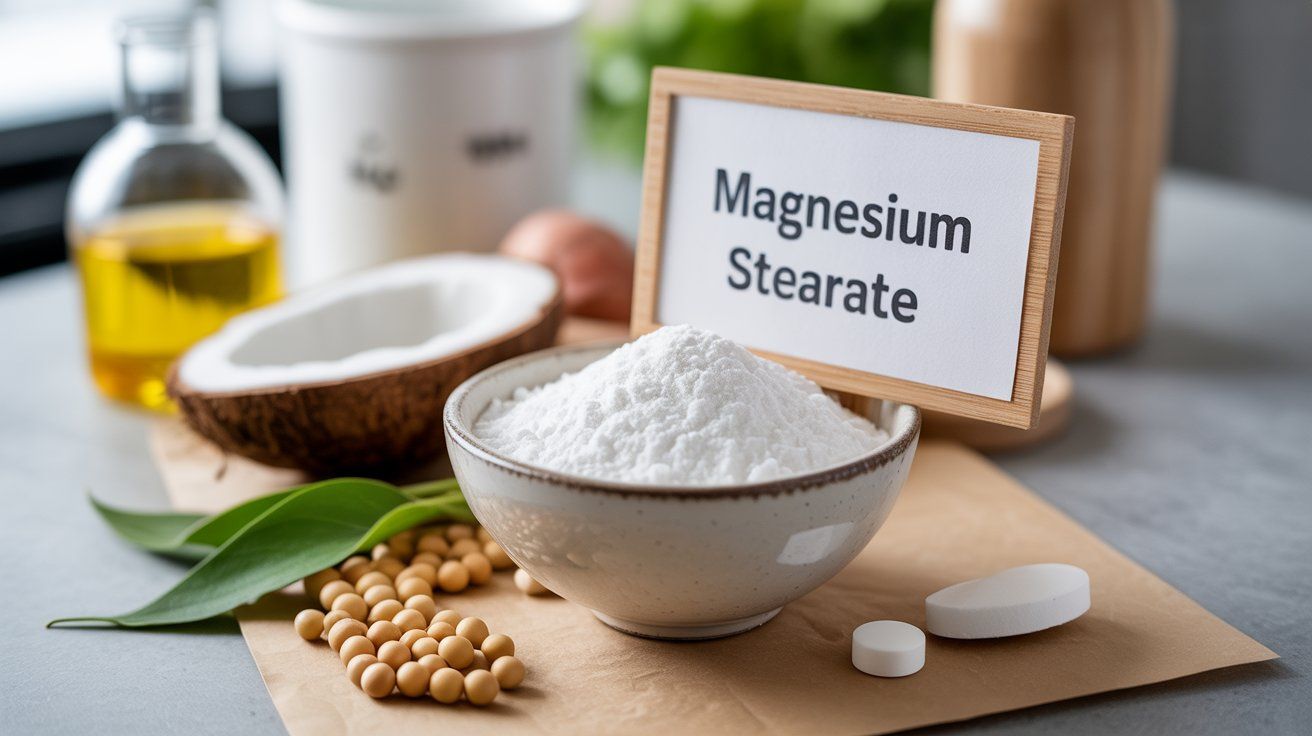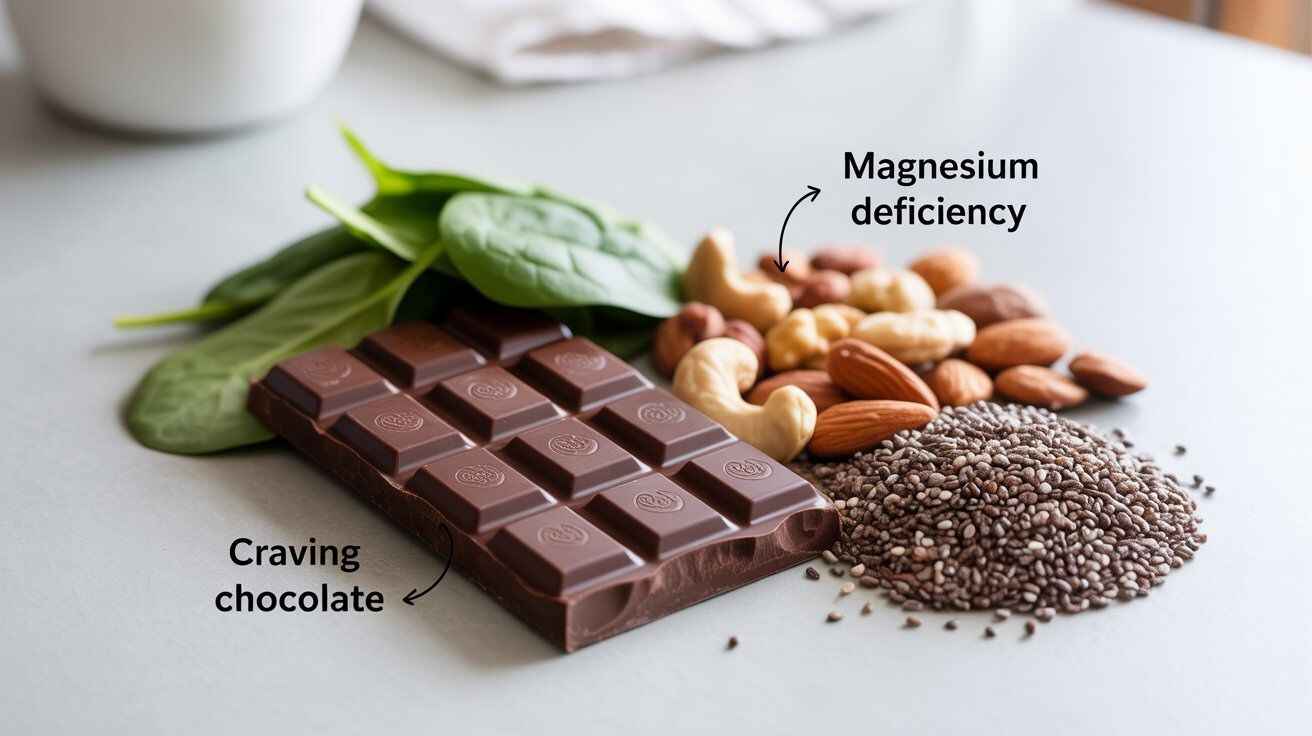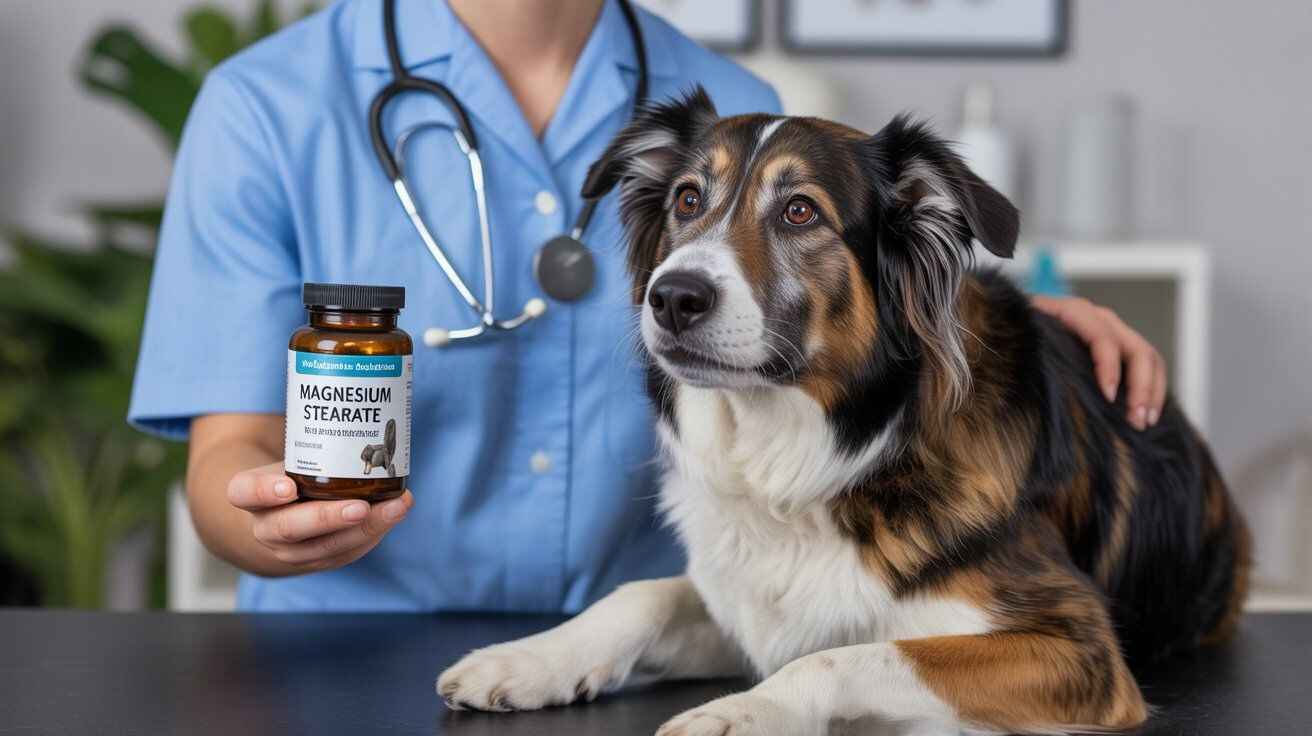Yes, you can take magnesium glycinate with alcohol, but not together. Alcohol lowers absorption—take it later to restore levels and reduce risks.
Can you take magnesium glycinate with alcohol
Magnesium glycinate is a well-absorbed supplement often used for sleep, anxiety, and muscle health.
Since alcohol can deplete minerals and disrupt absorption, many people wonder: can you take magnesium glycinate with alcohol?
This guide explains the science behind alcohol’s effect on magnesium, potential risks, and the safest way to combine supplements with drinking.
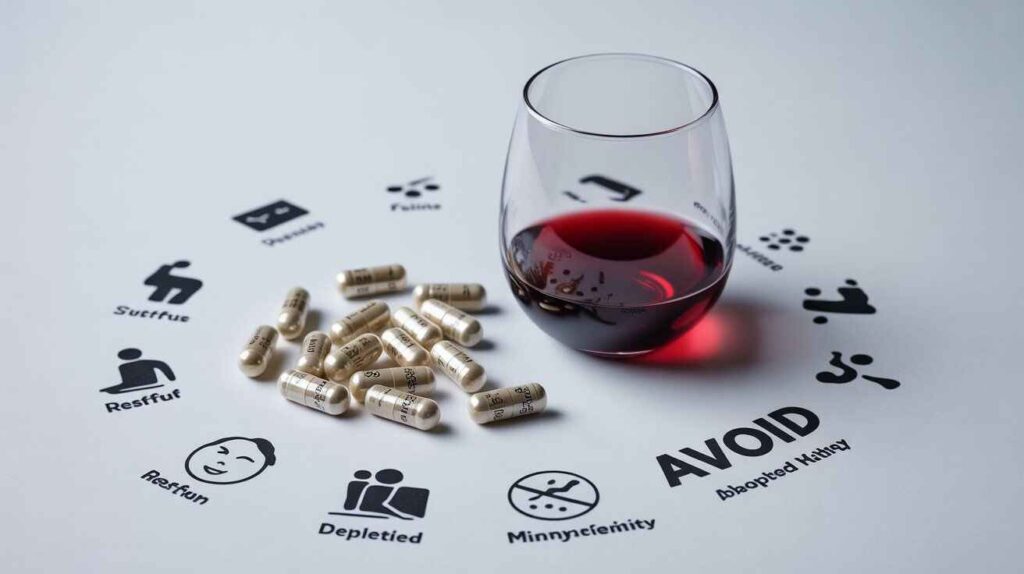
What Is Magnesium Glycinate?
Magnesium glycinate is a form of magnesium bound to the amino acid glycine, which makes it highly absorbable and gentle on digestion.
It’s often chosen to support sleep, anxiety relief, and muscle recovery.
Compared with other forms of magnesium, it causes fewer digestive side effects, making it a preferred supplement for long-term use.
How Alcohol Affects Magnesium Levels
Alcohol lowers magnesium by increasing urinary excretion and reducing absorption in the gut.
Chronic drinking can lead to magnesium deficiency, also called hypomagnesemia, which contributes to fatigue, cramps, and poor sleep.
This mineral loss also worsens electrolyte imbalance. Understanding these effects helps explain why timing matters when asking: can you take magnesium glycinate with alcohol?
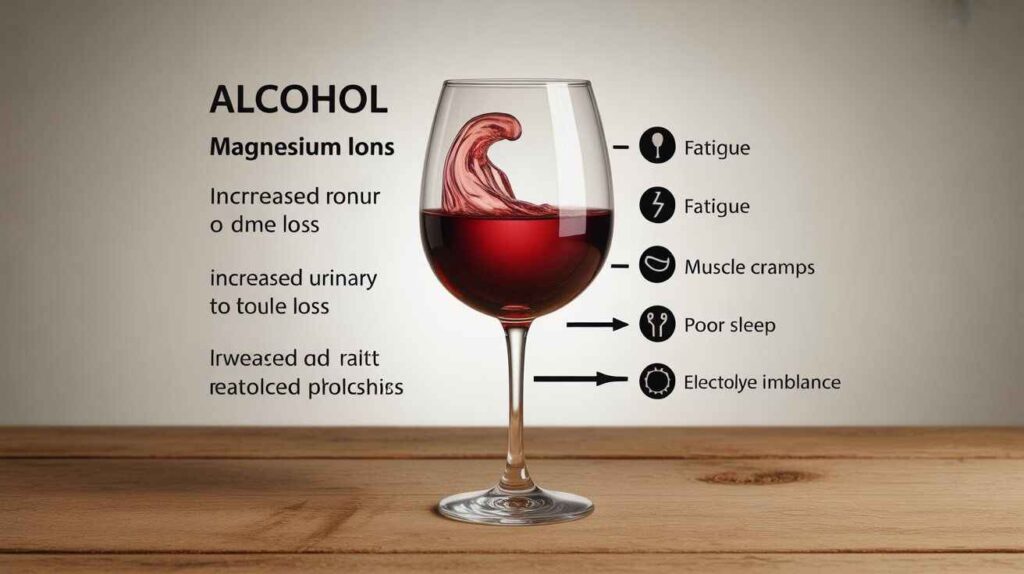
So, can you take magnesium glycinate with alcohol? Yes, but it’s not ideal to consume them together.
Alcohol interferes with magnesium absorption and may intensify side effects like nausea or drowsiness.
Taking the supplement at a different time, rather than alongside drinks, helps preserve its benefits and lowers risks tied to mineral depletion and digestive discomfort.
Is It Better to Take Magnesium Glycinate Before or After Drinking?
| Timing | Effect on Absorption | Benefits | Risks/Drawbacks |
|---|---|---|---|
| Before Drinking | Reduced due to alcohol blocking absorption | Minimal benefit since alcohol cancels much of it | Wasted supplement, less effective |
| During Drinking | Poor absorption, alcohol interferes directly | None significant | Higher chance of nausea, drowsiness, digestive upset |
| After Drinking (Best Option) | Better absorption once alcohol clears | Restores magnesium levels, supports hydration & recovery, reduces hangover fatigue | None major if within safe dosage |
Risks & Precautions of Mixing Magnesium Glycinate with Alcohol
Combining magnesium glycinate with alcohol may cause digestive upset, drowsiness, or reduced effectiveness.
People with kidney or liver problems, or those who drink heavily, face higher risks of deficiency and complications.
Medication interactions, especially with antibiotics or heart drugs, also matter.
To stay safe, separate intake and seek medical guidance if alcohol use is frequent.
Best Practices for Safe Use
To safely combine magnesium glycinate and alcohol, avoid taking them at the same time. Stick to recommended daily doses (200–400 mg), take supplements with food, and drink plenty of water.
Relying on dietary magnesium from leafy greens, nuts, and legumes also helps. These habits reduce risks of mineral depletion, electrolyte imbalance, and poor absorption.
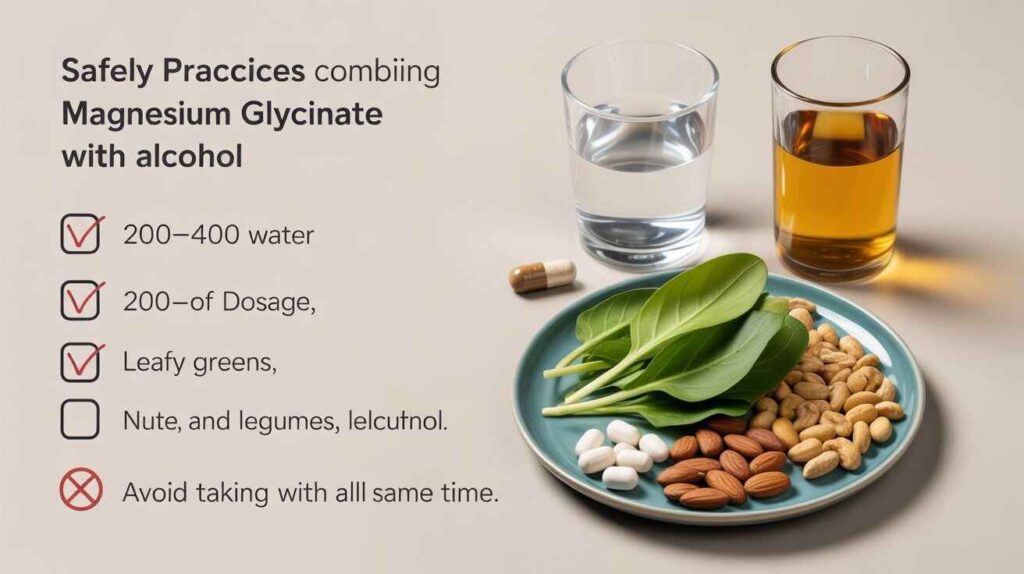
FAQs
Q1: Can you take magnesium glycinate with alcohol safely?
Yes, but not at the same time. Alcohol reduces magnesium absorption, so it’s better to space them apart.
Q2: Does alcohol cancel out the benefits of magnesium?
Alcohol accelerates magnesium loss, so it can blunt supplement benefits. Taking magnesium later helps replenish levels.
Q3: Can magnesium help with hangovers?
Yes. Magnesium may ease headaches, muscle weakness, and fatigue caused by alcohol’s mineral depletion.
Q4: Should I avoid magnesium glycinate if I drink regularly?
No, but frequent drinkers are at higher risk of deficiency. A doctor can guide dosage for safety.
Q5: What’s the safest way to take magnesium if I drink alcohol?
Take it after alcohol, ideally with food and water, not during drinking.

Hamid Raza, aged 65, is a seasoned expert in nutrition, health supplements, and wellness, with over four decades of experience researching and educating people about essential minerals like magnesium. His work focuses on helping individuals improve energy, bone health, muscle function, and overall wellness through scientifically-backed magnesium knowledge.
Throughout his career, Hamid has contributed to numerous health articles, research studies, and wellness blogs, making complex nutritional science accessible to everyday readers. Passionate about natural health solutions, he guides readers on choosing the right magnesium supplements for optimal health.

